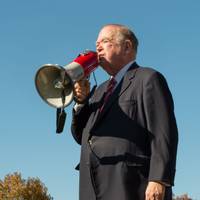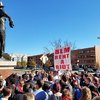Parents of a University of Oklahoma student asked whether their daughter would be safe attending classes. One woman wanted to know if she could grocery shop without being assaulted. Others, afraid to be identified as Muslim, inquired about religious law and removing their head scarves in public.
The phone calls to the Oklahoma chapter of the Council on American-Islamic Relations (CAIR) came in the wake of Donald Trump’s election on a platform built partly on a promise to ban Muslims and other immigrants from entering the United States unless they submitted to “extreme vetting” of their ideologies. He also called for building a wall along the nation’s southern border.
While many of those who voted Trump into office celebrated his victory as a triumph of nationalism, others heeded the Republican’s electoral college trouncing of Democrat Hillary Clinton as an emphatic endorsement of extremism.
“The biggest concern for the Islamic community is the country has elected somebody that is blatantly hateful and bigoted toward our community,” said CAIR-OK Executive Director Adam Soltani. “When that kind of rhetoric is allowed to take place on a national level, it creates an atmosphere of hostility, and a fear of Muslims in our country, and our community has felt that.”
In Oklahoma, acts of religious and racial hostility have bookended Trump’s election, leaving some academics, civil rights advocates and others to question whether the polarizing figure’s ascent has emboldened fringe groups on either end of the political spectrum.
“What we’ve seen in the last week are white separatists and white nationalists that have been emboldened by the election results, and we’ve seen a rise in reprehensible speech,” said Ryan Kiesel, executive director of the American Civil Liberties Union of Oklahoma. “What they believe is they have this new license to say and do things they may not have said and done a week ago.”
Oklahoma Republican Party Chairwoman Pam Pollard said a small sector of Americans are taking advantage of an outspoken candidate “to go out and speak and protest their feelings that they have held for many years.”
But, she added, “people need to be very, very careful before they draw an unfair correlation to Mr. Trump and Trump’s campaign, and often long and deeply held prejudices,” Pollard said.
Regardless, on the state’s college campuses, in the halls of the state Capitol and elsewhere, anger and animosity over the campaign continues to simmer across the Sooner State.
Some believe Trump’s victory is inspiring individuals to openly launch threats against their perceived enemies, or exposing long-standing racism and bigotry in American culture.
“I think it’s both,” said Jeanette Mendez, head of Oklahoma State University’s political science department. “I think it’s racist attitudes already out there, but people are feeling comfortable expressing that because of the rhetoric the campaign expressed.”
‘Simple, but inaccurate’
Mendez cautioned that labeling Trump supporters as racists and blaming the president-elect for inflammatory acts in the aftermath of the election may be a simple but inaccurate assessment. She noted that Trump supporters have been assaulted before and after the campaign.
“I don’t believe I live in a country of 51 million white racists,” Mendez said. “It’s an easy thing to say that Clinton lost because of white racists. It’s an elitist thing to say. They have no shot of getting working class voters that way. I think that’s a really nice, simple message, but we seem to be converging on a message that is untrue.”
Still, when President-elect Trump appointed Stephen K. Bannon, chairman of right-wing Breitbart News, as his chief strategist, some took the move as confirmation that Trump will steer policy in an extremist direction.
Mendez said such assumptions stem from political biases.
“I think on the one hand the message from Trump is, ‘this is a way to stick to my campaign promises,’ and I think at the same time, with selecting Reince Priebus (as chief of staff), he’s saying ‘I want to work with the Republicans.’ I think Democrats, regardless of who is picked in these Cabinet positions, are going to be apprehensive, and Republicans are going to be supportive. If we assume Trump is a racist white nationalist, we’re going to assume Bannon is.”
Anger at OU
On Thursday, two anti-Black Lives Matter protesters on OU’s South Oval drew an angry crowd numbering in the hundreds. That prompted an arrival from OU President David Boren, who used a megaphone to condemn the speech, threaten the protesters with arrest and argue that such bigotry had no place on campus.
“I condemn the hatred he is spewing,” Boren told a cheering crowd.
Boren’s public comments came just weeks after a white nationalist organization, Identity Europa, plastered a handful of OU buildings with posters proclaiming “Let’s Become Great Again” and “Protect Your Heritage,” and just two days after an OU history professor posted on Twitter photos of what she said were white supremacist fliers found on campus. One flier was titled “Race and Intelligence: the Facts.” The other flier was titled “Why White Women Shouldn’t Date Black Men.”
The posters prompted the OU student government to pass a resolution “condemning hate speech,” and calling on university administration “to take additional steps to ensure the psychological and physical safety and well-being of students.”
In a phone interview, associate professor Kathleen Crowther said the white supremacist fliers were posted on a public notice board and she immediately contacted OU police. It is unclear whether the fliers came from students on campus. Crowther said the dean of Arts and Sciences convened with faculty to discuss the matter.
Crowther said there has been discussion among faculty about whether Trump’s election has stoked white racist activity.
“People are really angry about it,” she said. “We’re really worried about our students. That’s my primary concern. There a lot of students who are anxious. We’re hearing reports of students who are frightened to walk on campus.”
A Twitter account created in September, @yourbadou, seeks to track racist acts on campus. Several incidents are mentioned, including one tweet alleging that a white male called another student a “chink” and spit on him.
Boren also took to Twitter, issuing a Nov. 14 statement to the campus community that “there will never be a place at this university for expressions of hate and bigotry. As president of this university such inhumane conduct will not be tolerated by me.”
A day later, he announced that a student — who had been suspended and was under investigation for sending racist and violent messages to black students at the University of Pennsylvania through a cellphone app — was no longer enrolled at OU.
Similar racially-tinged incidents have been reported on other campuses across the state. At Tulsa Community College, a student was suspended last week for his role in posting racist messages. At Southeastern Oklahoma State University in Durant, campus police removed three people for allegedly inciting violence. The group had received permission to preach the Gospel near the clock tower, but according to President Sean Burrage, they carried a sign that called the Black Lives Matter organization “racist thugs,” and yelled at students about fornication.
Capitol concerns
Meanwhile, two weeks before the election, Rep. John Bennett, R-Sallisaw, held a state Capitol hearing on “radical Islam, Sharia Law, the Muslim Brotherhood and the radicalization process.”
Bennett, who was joined by Reps. Bobby Cleveland, R-Slaughterville, and Randy Grau, R-Edmond, condemned Muslim groups including CAIR, and said “we’re going to do all we can to kick these terrorist organizations out of the state of Oklahoma and do whatever it takes to protect our citizens.”
Later, Bennett, who served with the Marines, posted a comment on his Facebook page that appeared to call for Clinton’s execution.
“2 words…firing squad,” said the post, that was later taken down. When asked about the comment, Bennett shrugged off criticism, saying his words were “barracks talk.”
The Oklahoma Democratic Party condemned the post, calling it “another cowardly act from one of our state leaders,” and a threat that should be taken seriously.
By the numbers
The Southern Poverty Law Center says it counted 437 reports of “hateful intimidation and harassment,” nationwide between Nov. 9, the day after Trump was elected, and Nov. 14.
Collecting news reports, social media posts and direct submissions to SPLC, the organization says many incidents involved references to the Trump campaign and its slogans. SPLC says the harassment took place mostly at schools, businesses and universities, but vandalism and leafleting has also been common on private property. Included in the tally were 38 instances of racial slurs shouted from moving vehicles.
As of Wednesday, the only Oklahoma report — other than the fliers and posters at OU — was of a black woman who claimed to enter an Oklahoma City Walgreens when a white man and woman stalked her, and later punched her and pulled off her headscarf, SPLC says. The pair allegedly mistook the woman for a Muslim, and told her she wasn’t wanted in the country.
“Since Donald Trump won the election, we’ve seen an alarming number of hate-based incidents occur throughout the nation, some of which are no doubt stemming from Trump’s hate-filled campaign,” said Heidi Beirich, director of SPLC’s Intelligence Project, in an emailed statement. “We’ve collected more than 435 such incidents since the election — truly a frightening number.”
Soltani, the executive director of CAIR-OK, said there are an estimated 40,000 Muslims in Oklahoma, and 12 mosques. Other than anecdotal posts on social media, CAIR-OK hasn’t seen much in the way of threats or violence against Muslims in the state.
“We’ve not had any official reports that signify an increase in civil rights violations and discrimination,” he said. “We are, as an organization, bracing ourselves for an increase in reports. Maybe not now, but particularly in the coming year, when Trump takes office.”



